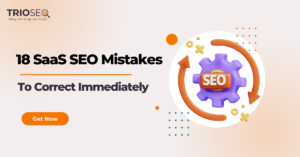Do you need an SEO cost calculator to help determine your budget?
SEO planning can be like traversing a foggy forest—unexpected costs loom suddenly. Still, a well-executed strategy is essential to see results.
The good news? A cost calculator eliminates the guesswork.
We’ll outline the mysteries of fluctuating expenses and help you get on the right path (while also helping you calculate your SEO costs).
So, let’s dive right in!
How Much Should I Spend on SEO?
The answer is more complex than you may think.
There are many factors to consider when budgeting for SEO. And this extends beyond merely playing with numbers.
Firstly, needs and financial capacities vary from one company to another. For instance, a small business may not require the marketing arsenal of a global corporation.
Secondly, your business model matters a lot. Are you a local brick-and-mortar store aiming to attract nearby/local customers or an e-commerce platform striving for organic traffic from all over the country?
Thirdly, higher competition directly translates to higher costs. If you’re operating within a hotbed of competition, there’ll undoubtedly be disparities in keyword costs compared to calmer markets.
This leads us directly to our other consideration: The keywords themselves.
Carefully analyze the frequency of keyword usage versus effectiveness – reflected in measures like Click-through Rates (CTRs) and organic rankings.
To sum it up –
- Understand your business needs
- Analyze market competition
- Regularly review budget allocations
With this in mind, you can now use our free SEO calculator below to understand what your ideal budget should be.

Measuring Organic Search ROI
SEO calculators help quantify the value you will get from your SEO strategy.
Such a tool doesn’t just reveal how much SEO costs per month. It also gives an idea of whether your investment is paying off.
There are two ways to calculate the ROI:
Organic Search ROI Calculation Assuming “One Shot”
Let’s begin with the ‘one shot’ scenario.
Suppose we classify ‘one-shots’ as consumers visiting your website and making a single purchase without becoming repeat customers. In this case, the main focus is attracting new visitors to increase the chance of buying.
Your return on investment calculation within such contexts will mainly rely on factors such as the SEO service price and the resulting traffic boost. Since a direct percentage of the gained traffic would be converted into paying customers, you can subtract your SEO costs from net profits earned through these new conversions. Here are the steps –
- Calculate total sales: Use the average profit margin per sale to calculate the total profit from new purchases in a specific time period.
- Deduct SEO costs: Subtract the SEO costs incurred in the same time period.
- Translate into percentage form: Use the following percentage formula:
ROI Percentage = (Net Profit ÷ Cost of Investment )* 100

Organic Search ROI Calculation Assuming Lifetime Value
Looking at it another way, there’s a different method of calculation. This approach focuses on the lifetime value of loyal customers, suggesting that their potential profits extend well beyond just singular transactions.
Within these assessments –
- Estimate client lifespan in years: This depends on business type and industry averages.
- Annual gross revenue per customer obtained: We include any up-sells, cross-sell, or recurring product purchase possibilities they may use during their relationship with you.
- Multiply those figures together: You estimate what a client is worth throughout their engagement with your business.
- Subtract acquisition costs: Include advertising spending plus significant discounts used as an incentive.
ROI Percentage = [(Net CLV – Cost of Investment) ÷ Cost of Investment]*100
When calculating organic search ROI, CLV highlights that not all customers are passing by or influenced only by their first visit to our site.
Their lifetime value may exceed the profits of a single transaction, revealing longer-term benefits.

Breaking Down SEO Costs
Understanding the costs associated with SEO is essential for businesses planning digital marketing strategies. Given the importance of SEO in contemporary online business, let’s break down some aspects that contribute to your overall budget.
Fixed Costs vs. Variable Costs
There are two primary types of costs in SEO: fixed and variable charges.
Fixed costs are generally upfront payments incurred at the initial stages of an SEO campaign. These could include expenses like website design, keyword research, or technical audits. Once you make these investments, they remain fixed.
On the other hand, variable costs fluctuate based on your campaign’s ongoing requirements. For example, content creation prices can vary depending on the quantity or the complexity of topics. Link-building services might also prove expensive, depending on the industry sector or competitiveness.
Types of Fees Involved
Several fees can also come into play when estimating the cost of SEO. A few significant ones might involve:
- Project-based fee: This one-time charge might encompass a particular project or service within an SEO package.
- Monthly retainer fee: A continuous payment plan for expert advice and service over extended periods often involves a retainer model.
- Hourly consulting fee: Professionals lending expertise by the hour usually earn remuneration using this fee structure.
Each pricing model correlates with different needs and execution plans – making it critical to understand your requirements before settling on an agreement with your SEO vendor.

Types of SEO Services
SEO is constantly in flux. For businesses to stay ahead, they must keep up with the latest techniques and possible service types.
Let’s dive into these offerings and see how they can amplify your organic visibility.
On-page Optimization
On-page SEO involves fortifying the elements within your website to amplify its appeal to search engines.
These factors differ significantly from content quality to response time for page loading. Still, they are all integral to a comprehensive SEO strategy:
- Content: Content is often hailed as king, especially in onsite optimization, due to its profound influence on keyword ranking predictions.
- Site Structure: A neatly structured website improves user experience and facilitates easier web crawling for search engine bots.
- Meta Descriptions & Tags: These brief meta descriptions enable search engines to ascertain what each webpage entails, fostering better ranking results.
These components should be continually optimized according to ongoing best practices.
Off-page Optimization
Off-page optimization or off-site SEO seeks ways outside your website’s infrastructure to enhance its standing within search engine rankings. These initiatives include building credible backlinks with high-quality sites in your industry, including social signals (like shares) and brand mentions on other sites.
Technical Optimization
This type of SEO focuses on improving the technical aspects of a website to help search engine spiders crawl and index the site more effectively.
It includes optimizing site structure, improving mobile friendliness, increasing page speed, implementing SSL, and creating XML sitemaps.

How to Make an SEO Budget
Crafting an SEO budget is crucial for maximizing your online growth.
Here’s a step-by-step approach to help you navigate this task efficiently.
1. Understand Your Goals
Before diving into the budgetary aspects, pinpoint what you want to achieve with SEO. Are you aiming to elevate organic traffic, amplify conversions, or increase page rankings? Defining these goals will provide a more precise direction when discussing potential services and costs with agencies.
2. Assess Your Current Position
Understanding where you currently stand is pivotal. Utilize tools like Google Analytics to analyze your website’s present SEO performance. Knowing your starting point will enable you to convey your needs more effectively to potential agencies and understand the work scope. If these tools seem out of reach, work with an agency that will perform an audit.
You can connect with us at TrioSEO for a free SEO audit here.
3. Consider Additional Costs
While an agency might cover many aspects of SEO, there could be extra costs. For instance, these can include niche services like extensive link-building, advanced technical SEO audits, or custom analytics and reporting.
It’s essential to factor these into your budget to avoid unexpected expenses.
4. Leave Room for Flexibility
Digital trends shift and new algorithms often roll out, affecting your SEO. As you collaborate with an agency, reserve some of your budgets for unforeseen changes or new strategies that might emerge with time.
5. Monitor and Adjust
Even after hiring an agency, it’s crucial to stay engaged. Regularly review the results of implemented strategies. Discuss reallocating resources to more promising areas if specific tactics aren’t delivering the expected ROI.
Budgeting when hiring an agency involves careful planning, research, and consistent oversight. By understanding your specific goals and remaining adaptable, you’ll be well-positioned to maximize your SEO investment.

The Hidden Costs of Cheap SEO Services
The allure of cheap SEO services can be enticing, especially for small business owners on a budget. However, lower costs also come with hidden expenses that may not be beneficial in the long run.
Let’s uncover some of these covertly expensive aspects:
Services Focused Solely on Keywords
While keywords are undoubtedly an essential aspect of SEO, focusing solely on this single facet raises a red flag. The service might be affordable, but it overlooks other crucial SEO elements like high-quality content creation and search-intent strategies.
Moreover, keyword stuffing—a practice common among low-cost providers—can lead to website penalties from Google due to perceived manipulation attempts.
Therefore, while such an approach could seem cost-effective initially, there’s potentially more significant expense down the line in terms of lost traffic and rankings caused by penalties.
Linking Schemes
Inexpensive SEO services often resort to linking schemes as part of their strategy. They use unnatural or questionable tactics to increase your site’s number of backlinks quickly. Although this might seem attractive initially, Google considers such practices unethical.
Guaranteed Rankings
Rankings aren’t something any credible SEO professional will guarantee. They’re determined by algorithms and subject to change depending on many factors outside our control—yet many inexpensive providers still promise them.
Unfortunately, too many businesses fall into this trap because guaranteed success sounds appealing and cost-efficient for those figuring out how much SEO costs for a small business. Ultimately, though, these guarantees are hollow—the price you pay in damaged reputation or lost revenue when unrealistic promises aren’t fulfilled far exceeds the initial savings.
Quick Rankings
The promise of quick rankings is another deceptive tactic that cheap SEO service providers employ. This illusion further complicates matters when estimating costs.
In reality, SEO takes time before yielding results; rushing things may imply using black hat techniques, which negatively impact onsite visibility and ranking over time—incurring more substantial costs later when attempting to fix problems.
Conclusion
A clear SEO budget isn’t just a supplementary detail. It can distinguish between moderate success and tremendous growth.
Effective SEO, executed judiciously, can be a game-changer for businesses of all sizes. It boosts online visibility, driving more traffic and sales when managed right.
Budgeting for SEO requires careful thought. While it’s tempting to save costs, inadequate investment can result in lackluster outcomes.
As we conclude, remember that effective SEO is a marathon, not a sprint. Just as Rome wasn’t built overnight, search rankings won’t soar instantaneously. Success in SEO hinges on persistent effort, intelligent strategies, and the right tools.
Before you go, here are some related topics you might enjoy:




![Featured Image - Mental Health Content Writing [Best Practices and Ethical Considerations]](https://trioseo.com/wp-content/uploads/2024/05/Mental-Health-Content-Writing-Best-Practices-and-Ethical-Considerations-300x157.png)
![Featured Image - Beginner’s Guide to CBD Content Writing [Tips Included]](https://trioseo.com/wp-content/uploads/2024/05/Beginners-Guide-to-CBD-Content-Writing-Tips-Included-300x157.png)

![Featured Image - [Ultimate Guide] SEO For Tech Companies That Outranks Competitors](https://trioseo.com/wp-content/uploads/2024/04/Ultimate-Guide-SEO-For-Tech-Companies-That-Outranks-Competitors-300x157.png)

![Featured Image - B2B SaaS SEO - Ultimate Guide [Strategy Included]](https://trioseo.com/wp-content/uploads/2024/04/B2B-SaaS-SEO-Ultimate-Guide-Strategy-Included-300x157.png)

